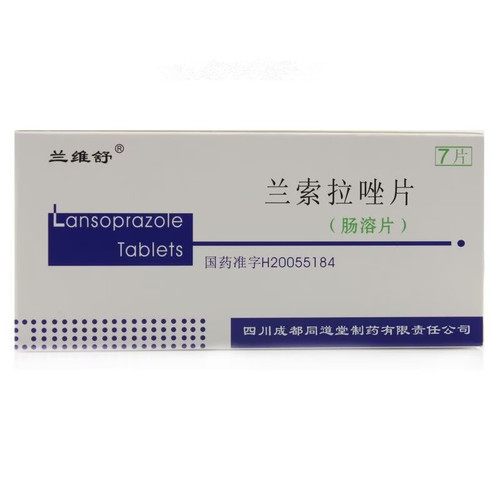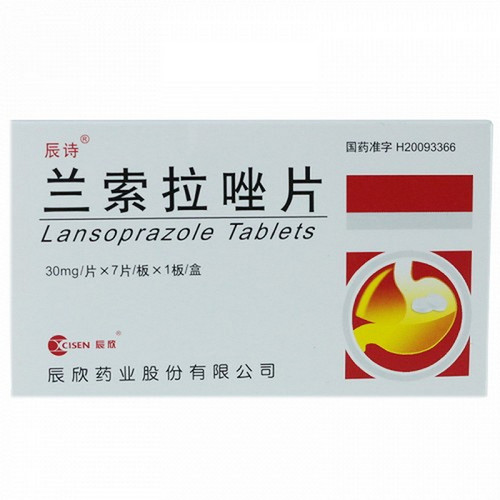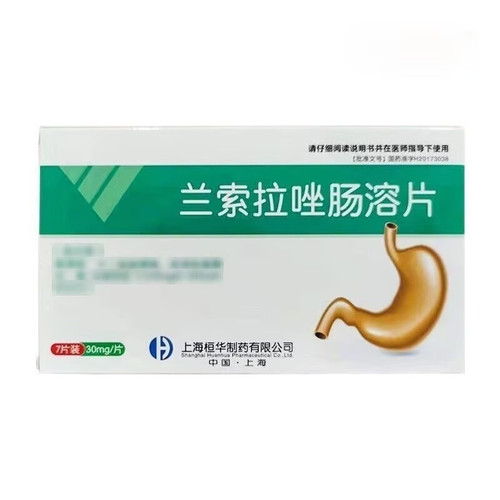Product Overview
[Drug Name]
Generic Name: Lansoprazole Tablets
Trade Name: Lanweishu Lansoprazole Tablets 30mg x 14 Tablets
Pinyin Code: LanWeiShu LanSuoLaZuoPian
[Main Ingredient]
The main ingredient of this product is lansoprazole. Chemical name: (±)-2[3-methyl-4-(2,2,2-trifluoroethoxy)-2-pyridyl]methyl]sulfinyl]-1H-benzimidazole. Molecular Formula:
C₁₆H₁₄F₃N₅O₂S Molecular Weight: 369.37
[Properties]
This product is enteric-coated tablet. After removal of the enteric coating, it appears white or off-white.
[Indications/Main Functions]
Gastric ulcer, duodenal ulcer, reflux esophagitis, Zollinger-Ellison syndrome (gastrinoma).
[Specifications]
30mg x 14 tablets
[Dosage and Administration]
Usually, adults take two 30mg lansoprazole tablets orally once daily. For duodenal ulcers, take continuously for 4-6 weeks; for gastric ulcers, reflux esophagitis, and Zollinger-Ellison syndrome, take continuously for 6-8 weeks. Or as directed by a physician.
[Adverse Reactions]
1. Hypersensitivity: Occasionally, symptoms such as rash and itching may occur. Discontinue use if these symptoms occur. 2. Hematologic: Occasionally, symptoms such as anemia, leukopenia, and eosinophilia may occur. Thrombocytopenia rarely occurs. 3. Digestive: Occasionally, symptoms such as constipation, diarrhea, thirst, and abdominal distension may occur. Elevated ALT, AST, ALP, LDH, and γ-GTP levels may occur. Careful observation is recommended. If any abnormalities are detected, appropriate measures should be taken, including discontinuation of the drug. 4. Neuropsychiatric: Occasionally, symptoms such as headache and drowsiness may occur. Insomnia and dizziness rarely occur. 5. Other: Occasionally, symptoms such as fever, elevated total cholesterol, and elevated uric acid may occur.
[Contraindications]
This product is contraindicated in patients with allergies.
[Drug Interactions]
Lansoprazole may delay the metabolism and excretion of diazepam and phenytoin, increasing the peak plasma concentration of acetaminophen and shortening its duration.
[Precautions]
1. Observe closely during treatment. Due to insufficient experience with long-term use, this product is not currently recommended for maintenance therapy. 2. Do not chew this tablet; swallow it whole with water. 3. Use with caution in patients with liver dysfunction and the elderly. 4. This product may mask the symptoms of gastric cancer; therefore, it should only be used after the possibility of gastric cancer has been ruled out.
[Pediatric Use]
The safety of this product for pediatric use has not been established (there is very little clinical experience in pediatric patients).
[Elderly Use]
Generally, elderly patients experience decreased gastric acid secretion and other physiological functions, so observe carefully during use.
[Overdose]
Unknown.
[Pharmacology and Toxicology]
This drug is a benzimidazole compound. After oral absorption, it is translocated to the gastric mucosa and, under acidic conditions, converted into an active metabolite. This active metabolite specifically inhibits the H+/K+-ATPase system in gastric parietal cells, blocking the final step of gastric acid secretion. This drug inhibits basal and stimulated gastric acid secretion in a dose-dependent manner. It does not antagonize cholinergic and amine H2 receptors.








